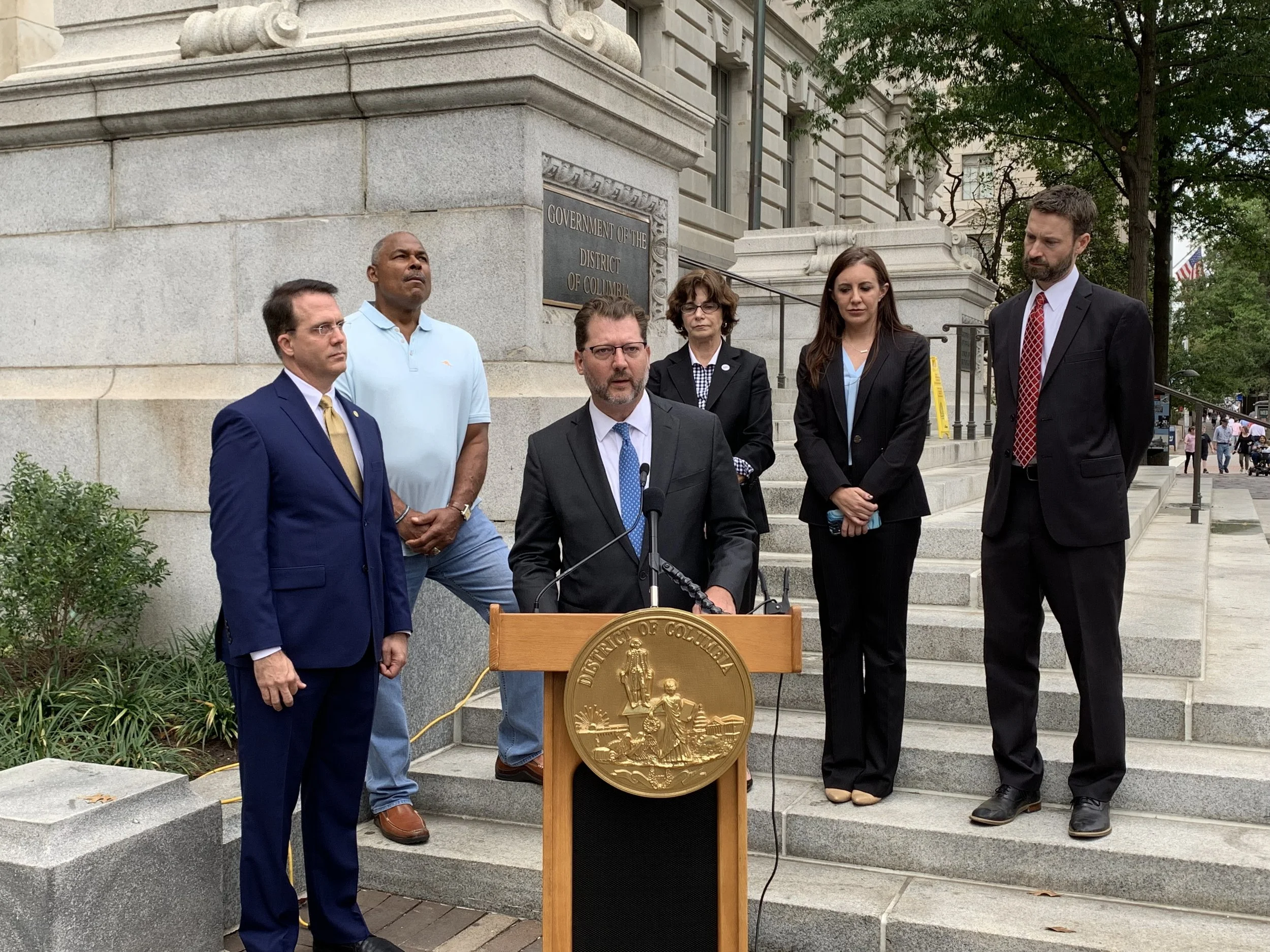For Immediate Release:
October 7, 2019
Contacts:
Councilmember Grosso: Matthew Nocella, 202.724.8105 - mnocella@dccouncil.us
Zero Abuse Project: Melissa Green, 202.618.6961 - melissagreen@rational360.com
Grosso joined by national advocates to encourage victims of sexual abuse to file civil claims under new law
Washington, D.C. – Victims of sexual abuse in the District of Columbia may be eligible to file civil lawsuits against their abusers, even if previously barred by the statute of limitations under a law enacted by the D.C. Council last year.
The Sexual Abuse Statute of Limitations Amendment Act of 2018, which incorporated parts of Councilmember David Grosso’s Childhood Protection Against Sexual Abuse Amendment Act, ended the criminal statute of limitations and extended the civil statute of limitations for any case of sexual abuse–not just acts of sexual abuse that occurred while the survivor was a minor.
Additionally, the law created a two-year window for civil claims that were previously time-barred for survivors up to the age of 40 to be filed.
“The recent spate of high-profile cases involving allegations of and convictions for sexual abuse underscore the pervasiveness of sexual assault in America,” said Councilmember David Grosso at a press conference held today with advocates for survivors of sexual abuse. “The prevalence of these incidences, across every sector, from the Catholic Church to as far-reaching as the Office of the President of the United States, defies the word ‘problem.’ As policymakers, we have to ensure that every available option is afforded to those who have been harmed. This law will allow the many courageous survivors across the city to seek justice under the law.”
Previously, civil actions related to sexual abuse must have been commenced within 7 years of the date the victim attains the age of 18 or 3 years from when the victim knew, or reasonably should have known, of any act constituting the abuse, whichever is later. Now individuals have until the age of 40, or 5 years from when they knew, or reasonably should have known, of any act constituting sexual abuse, whichever is later, to file a civil action.
D.C. is leading the way along with seven states as part of a growing national movement to end statutes of limitation for sexual abuse. Grosso partnered with national organizations Zero Abuse Project and the National Crime Victims Bar Association to educate and raise awareness of the window for survivors to file civil lawsuits over the next two years.
“I want to thank Councilmember Grosso for his efforts to assist survivors and protect the children of the District of Columbia from future abuse. Because of this work, under the Sexual Abuse Statute of Limitations Amendment Act of 2018, survivors of child sexual abuse can now seek justice and hold predators and the institutions that covered for them accountable for decades of abuse,” said Jeffery Dion, CEO of the Zero Abuse Project. “Moving forward, the new law also removes the perverse incentives for institutions to cover abuse as they can no longer just wait out a short statute of limitations to protect their reputation. The Sexual Abuse Statute of Limitations Amendment Act of 2018 is in fact our most powerful tool to stop abuse and protect kids.”
The law became effective on May 3, 2019 and thus victims of sexual abuse whose claims had been previously barred due to the statute of limitations have until May 3, 2021 to file civil lawsuits against their abusers.
“As a survivor of child sexual abuse that occurred here in DC, I want to commend Councilmember Grosso for a critical first step for survivors. The two year window and extending the age to 40 from 25 is a huge victory,” said former NFL player Al Chesley, who survived sexual abuse at the hands of D.C. police officer in his youth. “It took 33 years after my abuse to be willing to admit it to myself and talk about it with others – I was 48 years old which also happens to be the national average for survivors to come forward -- so I encourage everyone working to support survivors of child sex abuse to continue to push until there is no statute of limitations for civil cases.” Chesley continued.
The National Crime Victim Bar Association offers a referral service for survivors who would like to pursue civil suits. Referrals are based on type of case and location. Each survivor will be offered three referrals.
“The enactment of the Sexual Abuse Statute of Limitations Amendment Act of 2018 represents a crucial step in helping victims of child sexual abuse seek justice so long denied to them. It also represents a much-needed readiness to hold abusers, and those who remained complicit with abuse, accountable for their crimes,” said Renee Williams, Director of the National Crime Victim Bar Association. “The National Crime Victim Bar Association stands ready to assist victims of child sexual abuse by ensuring they have access to the civil justice system. Victims seeking an attorney can request an attorney referral by accessing victimbar.org/referrals or by calling 1-844-4HELPDC.”
“I hope more jurisdictions to follow our lead,” said Grosso. “Child safety depends on legislators holding institutions, not just individual perpetrators, accountable for their actions. We cannot continue to allow individuals or institutions to maintain their depraved secrets. We must instead encourage and empower victims to come forward and know that a fair and just system is in place to help them right unspeakable wrongs.”
Grosso and the Zero Abuse Project will hold a town hall at the John A. Wilson Building on Wednesday, November 6, 2019 to educate survivors about their options and connect them to resources to seek justice and healing.
###




